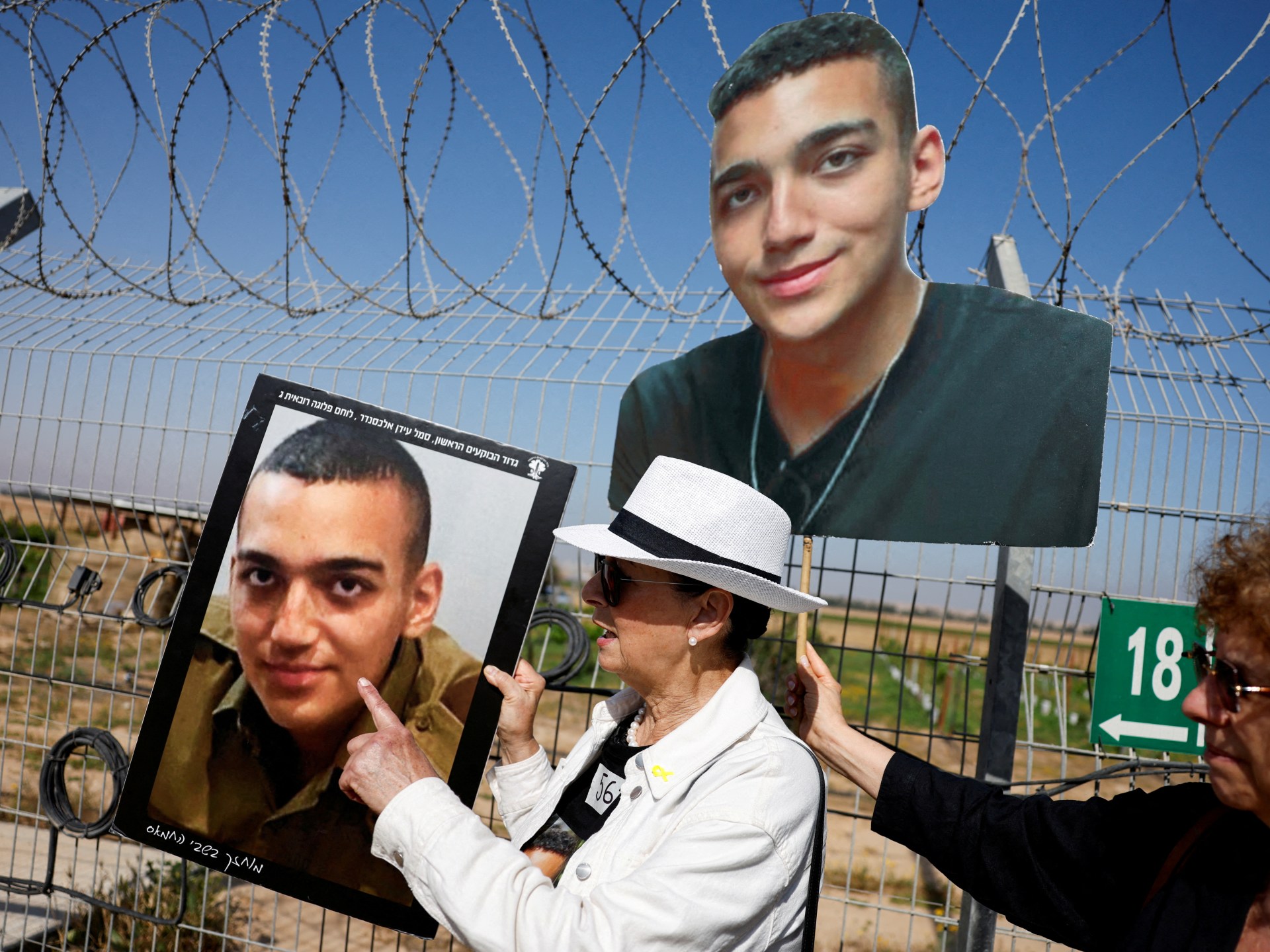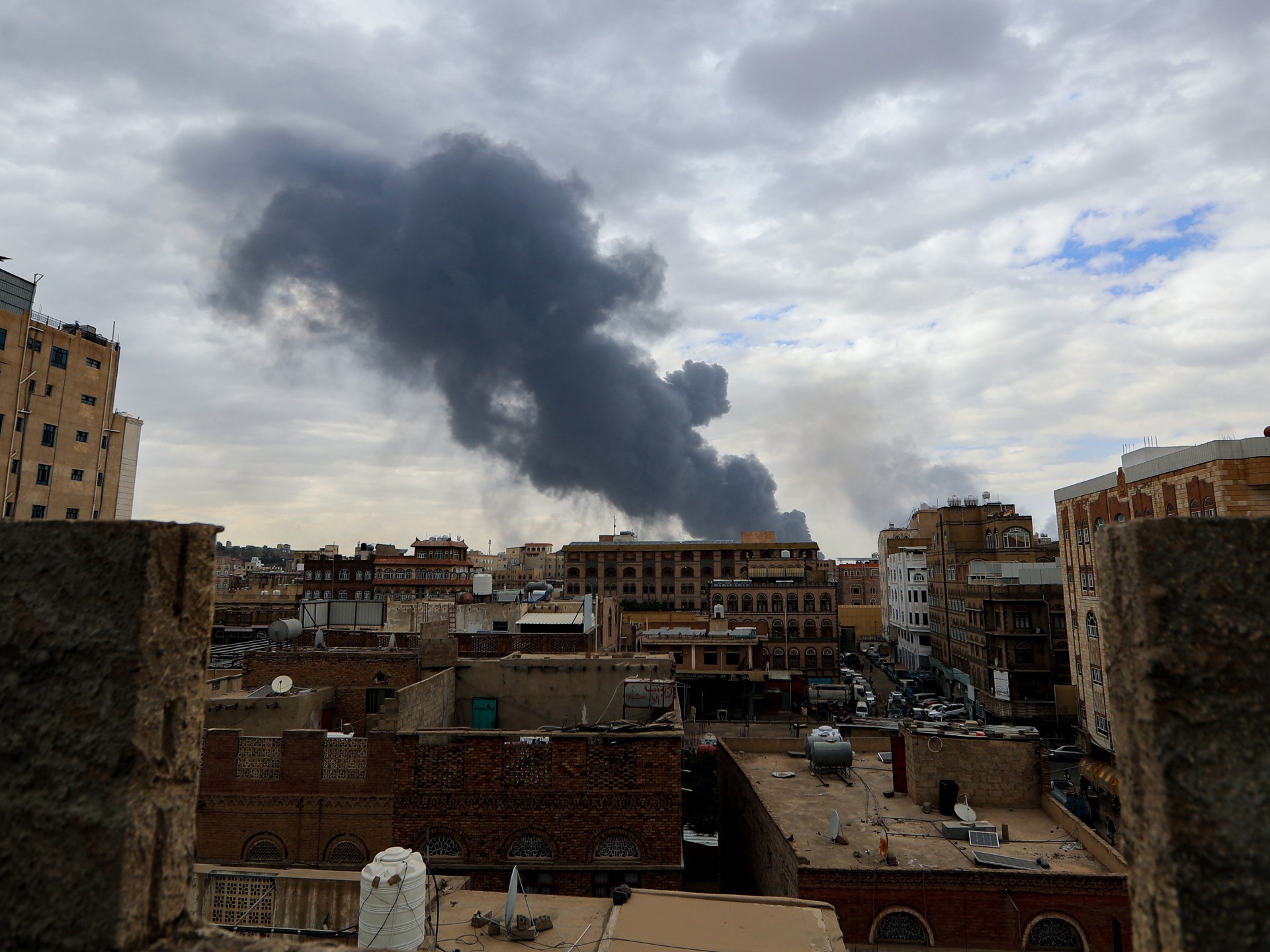Middle East
Turkish student Rumeysa Ozturk says she will continue to pursue her case | Israel-Palestine conflict News

A Turkish doctoral student at Tufts University in the United States has returned to Boston after spending more than six weeks in an immigration detention centre in Louisiana in what her lawyers call a politically motivated crackdown on free speech.
Upon arrival at Boston Logan International Airport, Rumeysa Ozturk told reporters on Saturday that she was excited to get back to her studies during what has been a “very difficult” period.
“In the last 45 days, I lost both my freedom and also my education during a crucial time for my doctoral studies,” she said. “But I am so grateful for all the support, kindness and care.”
A federal judge on Friday ordered her release pending a final decision on her claim that she was illegally detained.
Ozturk, 30, was detained on March 25 when immigration officials arrested her in Massachusetts, revoked her student visa and transferred her to the detention facility in Louisiana.
Supporters believe Ozturk, a Fulbright scholar from Turkiye, was targeted for having co-written an opinion article in her student newspaper, calling on Tufts University to acknowledge Israel’s war on Gaza as a genocide.
A genocide case against Israel is under way at the International Court of Justice. Last week, the former EU foreign policy chief Josep Borrell accused Israel of committing genocide.
Ozturk was joined by her lawyers and two of Massachusetts’s Democratic members of Congress, Senator Edward Markey and Representative Ayanna Pressley.
“Today is a tremendous day as we welcome you back, Rumeysa,” Markey said. “You have made millions and millions of people across our country so proud of the way you have fought.”
Ozturk’s lawyers say her visa was revoked without notice and she was not allowed to contact legal counsel for more than a day after her arrest.
Appearing in court via video on Friday, Ozturk spoke of her deteriorating health, including severe asthma attacks in detention, and her hopes of continuing her doctoral research on children and social media.
US District Judge William Sessions granted Ozturk bail, saying she presented no flight risk or danger to the public. He found that her claim of unlawful detention raised serious constitutional questions, including potential violations of her rights to free speech and due process.
Ozturk’s case highlights a practice that has become common under President Donald Trump’s administration. Foreign students have been arrested and hundreds of their student visas revoked for their pro-Palestine views.
Mahmoud Khalil, who led the protests against Israel’s war on Gaza at Columbia University in New York, was among the first students detained by Immigration and Customs Enforcement on March 8. He remains in custody.
The Trump administration has been accused of conflating criticism of Israel as anti-Semitism.
A Department of Homeland Security spokesperson previously accused Ozturk, without evidence, of supporting Hamas, which has been designated as a “terrorist” group by the US.
Ozturk denied any wrongdoing and said she will continue to pursue her case. “I have faith in the American system of justice,” she said.
Her legal battle continues in Vermont while immigration hearings proceed separately in Louisiana, where she may participate remotely.
Videos of her arrest, which show masked plainclothes officers taking her from a street in the Boston suburb of Somerville, Massachusetts, went viral and sent a chill across US university campuses.
Her lawyers at the American Civil Liberties Union argued that her arrest and detention were unlawfully designed to punish her for speech protected by the US Constitution’s First Amendment and to chill the speech of others.
Pressley, who with two other Democratic members of Congress from Massachusetts visited Ozturk while she was in custody, said she was held in “squalid, inhumane conditions” and denied proper medical care for worsening asthma attacks.
“Rumeysa’s experience was not just an act of cruelty. It was a deliberate, coordinated attempt to intimidate, to instil fear, to send a chilling message to anyone who dares to speak out against injustice,” Pressley said.
Middle East
Hamas says it will release US-Israeli captive Edan Alexander | Israel-Palestine conflict News

Hamas has said it will release a US-Israeli captive held in Gaza, as the group confirmed it was engaged in direct talks with the United States towards securing a ceasefire in the war-ravaged enclave and getting aid flowing again to a suffering Palestinian population.
The Palestinian group released a statement on Sunday: “Israeli soldier Edan Alexander, a dual US national, will be released as part of efforts towards a ceasefire” and the reopening of aid crossings. Israel has blocked all aid, including food, medicine and fuel, for 70 days.
The Hamas statement did not indicate when the 21-year-old Alexander would be released, but it is thought to be in the coming 48 hours.
Israeli media reported that US envoy Steve Witkoff will be in Israel on Monday as part of the deal.
The announcement comes shortly before US President Donald Trump’s visit to the Middle East this week – which does not include a trip to Israel. Trump and Witkoff have frequently mentioned Alexander by name in the past few months.
Alexander, who grew up in the US, was taken from his military base during the October 7, 2023 Hamas-led attack.
In its statement on Sunday, Hamas said it was willing to “immediately begin intensive negotiations” that could lead to an agreement to end the war and would see Gaza under a technocratic and independent administration.
“This will ensure calm and stability for many years, along with reconstruction and the end of the blockade,” the group said.
There was no immediate comment from the Trump administration.
Israeli Prime Minister Benjamin Netanyahu’s office said on Sunday that the US told Israel that Hamas’s freeing of Alexander would lead to negotiations for the release of more captives. The statement added that Israel’s policy hasn’t changed: negotiations will be conducted under fire with a continued commitment to achieving all war objectives.
‘A lot of questions’
Al Jazeera’s Hamdah Salhut, reporting from Amman, Jordan, said: “It’s unclear exactly what kind of reaction the Israeli government officials had with these direct talks between Hamas and the United States, but last time they were quite angry and that’s because the Israelis weren’t involved and had no knowledge of those talks and the Americans hit back by saying they didn’t need anyone’s permission to negotiate with any of the actors involved because they were American captives held in Gaza”.
“There are a lot of questions from a lot of different angles, specifically from the family members of those captives, from the larger part of Israeli society who have been protesting in the thousands for more than 1.5 years, accusing Benjamin Netanyahu of prolonging the war for his own personal and political gain. And in fact, Israeli officials have been saying the quiet part out loud in recent weeks, saying that the captives were not the main priority for the Israeli government and that they had other goals and objectives they needed to achieve”, she added.
“The family members of captives say that the Israeli government is choosing land grabs over the lives of Israelis who are still being held in Gaza”, she continued, referring to the Israeli government’s decision to expand its offensive in Gaza with a view to reoccupying parts of the territory.
Talks ongoing in Doha
Earlier on Sunday, two Hamas officials told the AFP news agency that talks were ongoing in the Qatari capital of Doha with the US and reported “progress” had been made.
One Hamas official, speaking about the talks with the US, said there was “progress made … notably on the entry of aid to the Gaza Strip” and the potential exchange of captives for Palestinian prisoners in Israeli custody.
A second official also reported progress “on the ceasefire in the Gaza Strip”.
Israel shattered the last ceasefire, which lasted two months, on March 18, launching a major offensive in Gaza and ramping up its bombardment of the territory.
It has also cut off all aid to Gaza since March 2, saying it would pressure Hamas to release the remaining captives. None have been released since the fleeting truce earlier this year, when several captives were exchanged for Palestinian prisoners.
A total of 59 captives are still in Gaza, around a third of them believed to be alive, after most of the rest were released in ceasefire agreements or other deals.
Starvation has taken hold across Gaza due to the Israeli blockade.
Earlier this month, the Israeli government approved plans to expand its offensive in the Gaza Strip, with officials talking of retaining a long-term occupying presence there.
The Health Ministry in Gaza said on Sunday that at least 2,720 people have been killed since Israel resumed its assault, bringing the overall Palestinian death toll since the war broke out to 52,829.
Middle East
Israel attacks Yemen’s Hodeidah, striking port areas | News

Israel has previously bombed Hodeidah and Sanaa International Airport; Houthi missile targeted Ben Gurion Airport in Tel Aviv.
Israel has launched air attacks on Yemen’s Hodeidah governorate, according to the Houthi Interior Ministry.
The attack late on Sunday came after the Israeli army said it had warned those present at three Houthi-controlled ports in the area to evacuate.
It was the latest salvo in exchanges between Israel and the Houthis.
Israel bombed the Hodeidah port after a Houthi attack near Ben Gurion Airport in Tel Aviv earlier this month.
Israeli strikes have also targeted parts of the Yemeni capital Sanaa and the main international airport there.
The Houthis have been firing missiles at Israel and on Israeli targets in the Red Sea in solidarity with Palestinians under fire since the war on Gaza began 19 months ago. Israeli attacks on Gaza have killed more than 52,000 people, including 57 who starved to death due to the total Israeli siege since March 2, according to Palestinian officials.
A ceasefire deal between Yemen’s Houthis and the United States does not include any operations against Israel, the group’s chief negotiator announced earlier this week. The Houthis stopped firing on Israel during the Gaza ceasefire earlier this year, but resumed when Israel imposed its punishing blockade and then resumed the war soon after.
The US military had been launching daily air strikes across Yemen for nearly two months, destroying infrastructure and killing dozens of people, including children and civilians.
Middle East
Sudan’s army and RSF paramilitary launch attacks across war-ravaged nation | Sudan war News

Port Sudan, el-Fasher, West Kordofan and West Darfur have all seen heavy fighting.
Multiple attacks by Sudan’s armed forces (SAF) and the paramilitary Rapid Support Forces (RSF) have struck various locations across the country now in its third year of a civil war.
At least nine civilians, including four children, were killed and seven injured in attacks on Sunday by the RSF in el-Fasher, the capital of North Darfur state in western Sudan, according to the Sudanese army.
During a sweep of the city, the SAF killed six RSF members and destroyed three combat vehicles, according to the statement. There was no immediate comment from the RSF on the army report.
El-Fasher is the last major city held by SAF in Darfur. For over a year, the RSF has sought to wrest control it, located more than 800km (500 miles) southwest of the capital, Khartoum, from the SAF, launching regular attacks on the city and two major famine-hit camps for displaced people on its outskirts.
In the meantime, Sudan’s civil defence forces announced on Sunday that they have full control over fires that erupted at the main fuel depot and other strategic sites in Port Sudan, the seat of the army-backed government, which has come under daily drone attacks blamed on the RSF over the past week.
The fires caused by a drone strike on the fuel depot on Monday had spread across “warehouses filled with fuel”, the Sudanese army-aligned authorities said, warning of a “potential disaster in the area”.
The Red Sea port city had been seen as a safe haven from the devastating two-year conflict between the SAF and RSF before the drone strikes began on May 4.
The attacks have damaged several key facilities, including the country’s sole international civilian airport, its largest working fuel depot and the city’s main power station.
On Tuesday, Sudanese authorities accused the RSF of being behind the drone strikes. The RSF has not commented on the allegations.
Port Sudan is the main entry point for humanitarian aid into Sudan. United Nations Secretary-General Antonio Guterres warned that the attacks “threaten to increase humanitarian needs and further complicate aid operations in the country”, his spokesman said.
Sudan’s army launched air strikes on the RSF in el-Khuwei in West Kordofan state and the state of West Darfur late on Saturday. El-Khuwei was captured by the RSF last week.
Activists and Sudanese accounts shared a video clip on social media showing the Sudanese army and their allied forces announcing that they had regained control over el-Khuwei after battles with the RSF on Sunday, according to Al Jazeera’s Sanad fact-checking agency.
Witnesses also reported drone strikes on Sunday, targeting the airport in Atbara, a city in the northern state of River Nile.
The RSF has been battling the SAF for control of Sudan since April 2023. The civil war has killed more than 20,000 people, uprooted 15 million and created what the UN considers the world’s worst humanitarian crisis.
-

 Europe2 days ago
Europe2 days agoRare medieval manuscript virtually unwrapped to reveal hidden details
-

 Middle East2 days ago
Middle East2 days agoAfter Israel’s bombs, Nabatieh’s Monday Market revives itself once again | Israel attacks Lebanon
-

 Middle East2 days ago
Middle East2 days agoIraq look to former Australia coach Arnold to boost 2026 World Cup hopes | Football News
-

 Africa2 days ago
Africa2 days agoUS unveils Gaza aid plan
-

 Sports2 days ago
Sports2 days agoTimberwolves searching for fan accused of ‘racially charged comments’ toward Draymond Green and say another fan was ejected
-

 Europe2 days ago
Europe2 days agoRising waters and overtourism are killing Venice. Now the fight is on to save its soul
-

 Conflict Zones2 days ago
Conflict Zones2 days agoPakistan launches Operation Bunyan Marsoos: What we know so far | India-Pakistan Tensions News
-

 Education2 days ago
Education2 days agoTrump’s dismantling of Education Department gives states ‘green light’ to pursue voucher programs




